No great expectations pinned to Karzai’s upcoming visit
Scheduled to meet Prime Minister Nawaz Sharif later this month.
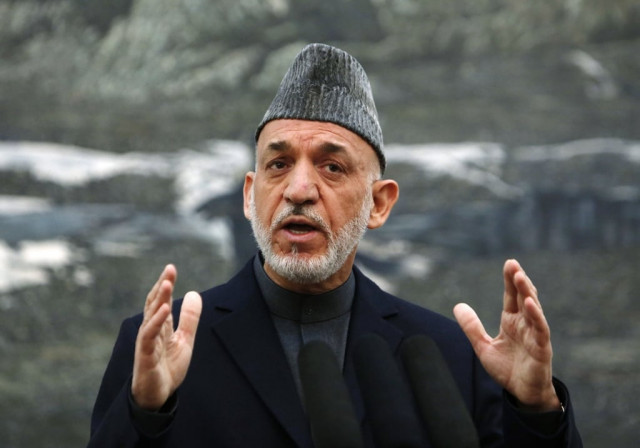
Afghan President Hamid Karzai. PHOTO: REUTERS/FILE
Scepticism surrounds Afghan President Hamid Karzai’s upcoming visit to Islamabad later this month.
Many Afghans believe no serious effort is being undertaken to bridge the trust deficit between the two countries and thus see little point in Karzai’s visit to Pakistan. This will be his last visit as Afghanistan’s president because he cannot run for a third consecutive term in the elections due in nine months. According to diplomats in Islamabad, it will also be Karzai’s 16th visit to the capital in the last 12 years.
Afghan foreign ministry spokesman Janan Mosazai is hopeful the visit will “open a new chapter” in bilateral relations. “We hope this visit will have a positive outcome, unlike several visits to Pakistan over the years. It should have viable and tangible outcomes in fighting terrorism and specifically on Pakistan’s role in the Afghan peace process,” he said during a briefing in Kabul on August 11.
Pakistan’s foreign ministry spokesman on Friday said: “There will be a substantive agenda for talks with the Afghan president, and the regional and post-2014 situation in Afghanistan will also be discussed.”
Some political analysts believe the visit could serve as the last opportunity to resolve differences between the two neighbours. They, however, remain sceptical.
Waheed Muzdha, an analyst who has previously worked in the Afghan foreign ministry during Taliban rule, said Karzai’s visit will not yield any results if he expects Islamabad to force the Afghan Taliban into holding peace talks.

“The Afghan government is mistaken to believe that Pakistan can bring the Taliban to talk to Afghan authorities or the Afghan High Peace Council,” Muzdha told The Express Tribune via phone from Kabul on Friday.
It is also wrong for Pakistani leaders to give the impression of yielding substantial influence over the Afghan Taliban. Such claims and Kabul’s high expectations would further deteriorate bilateral relations, he added. “Pakistan is in fact making claims of influence over the Taliban to seek privileges from the international community, particularly the West,” said Muzdha.
Former Afghan minister and writer, Dr Farooq Azam also expressed pessimism over Karzai’s upcoming visit. “No use of Karzai’s visit to Pakistan,” was his brief response.
Last month, Prime Minister Nawaz Sharif sent his security advisor Sartaj Aziz to Afghanistan upon Karzai’s request to lay the groundwork and agenda for the upcoming visit.
Afghan officials have pinned their hopes on Islamabad’s ‘promise’ to facilitate the peace process. They said President Karzai will urge Pakistan to honour these ‘promises.’ The Afghan opposition and the peace council also remain hopeful.
Meanwhile, National Coalition of Afghanistan Spokesman Fazel Sancharak has accused Pakistan of playing a key role in destabilising Afghanistan. “The president should avoid sceptical, contradictory and fluctuating talks with Pakistan,” he said in a recent debate on Afghan television.
Qazi Amin Waqad, an Afghan High Peace Council member, claimed Nawaz Sharif’s government is in a better position to play a pivotal role in reviving the Afghan reconciliation process. He said Sharif is familiar with Afghanistan because he played a vital role during the Islamabad Peace Accord in 1993.
Karzai seems desperate for direct talks with the Taliban and wants Pakistan’s assistance to achieve this, which will be his likely message to Sharif. The upcoming visit will also serve as a test case for Sharif in his efforts to normalise relations at a time when foreign troops begin their drawdown.
Afghan diplomats in Islamabad said Karzai will reiterate his call for the release of Taliban’s second-in-command Mullah Abdul Ghani Baradar and other Taliban prisoners in Pakistan’s custody.
Published in The Express Tribune, August 17th, 2013.


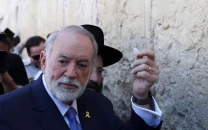

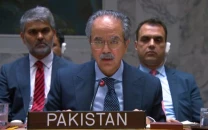
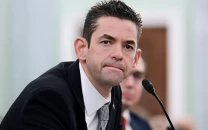
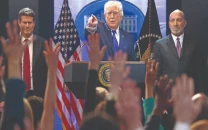











COMMENTS
Comments are moderated and generally will be posted if they are on-topic and not abusive.
For more information, please see our Comments FAQ